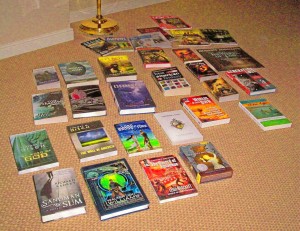I once saw Valery Gergiev conduct the Kirov Orchestra here in Niigata (we’re not that far from Russia, so they do a Japan tour now and then). A friend and I had seats right back up behind the orchestra, so it was almost like being in the group, and we had a perfect view of Gergiev’s face, close enough to see his expressions. Gergiev is one of the most prominent and best conductors in the world; at least over here, the classical section of the music store is filled with his CDs. And watching him, one truly gets the sense of being in the presence of greatness. I can honestly apply the term “larger than life” to perhaps three or four people I’ve encountered in my forty-odd [VERY odd] years, and Gergiev is one of them. I had the sense that he was chiseled from something other than flesh and bone — a great, moving statue, whose baton seemed more a liquid than a solid.
Why do I tell this story now? Well, the final thing he did that deeply impressed me was that on the final encore, he put down his baton, got the orchestra started on a Christmas medley with a few beats of his hand, and then he walked away from the podium and leaned against a side wall, just listening, basking in the music, and letting the Kirov Orchestra shine forth. The clear message was, “It’s all about them. They’re the group you’re here to hear, and they’re awesome.”
My point is, this blog is all about you! You’ve proven this week that you can all carry on just fine when I’m away in San Jose. What we have here is a community. My role is to get things started with a wave of my hand, and then I’m just reading along. A “Table Round,” as we’ve talked about before! Thank you all for those fantastic Hallowe’en stories and movie comments. The rambling house was plenty lived in while I was away, and it’s so good to see lights on when I come home!
Anyway, I know you’re waiting to hear about World Fantasy. I’ve been incredibly busy since getting back (I finally just unpacked today, Friday, after getting back on Tuesday night!) — had to jump right back into teaching on Wednesday. I’m correcting student compositions, and I’ve got homework to do from my agent — which is a good thing — a very good thing — but being away for a week has its costs!
So what I think will happen is that this convention report will be spread out over several posts. That will work out well, actually, because there are several discrete topics to address. (I mean “discrete,” not “discreet” — don’t get all disappointed when I don’t bring up any scandals!)
It was a wonderful time — beyond wonderful! I can’t say enough about how important these conventions are in keeping things in perspective for me. Seeing the reality of the fantasy publishing world firsthand is both good and potentially terrible. On the one hand, it’s enormously uplifting to be among one’s own people — all those engaged in doing the same thing, valuing most of the same things, etc. On the other hand, for the faint of heart, that could be extremely daunting. The WFC always reminds me of just what a lot of incredibly wise, smart, erudite, brilliant, talented, experienced people are working in the field. It’s humbling — who am I to think I can write books among such company? But then again, the conventions reaffirm just what a wide and diverse family we are. The World Fantasy Award judges said that, too: their judging experience revealed what a vast assortment of books and tastes the fantasy field embraces. We’re a family with young and old folks, hopefuls and successful and streetwise and weary, ambitious and lazy, charismatic and unbelievably eccentric members . . . we’re a family with skeletons in the closet. But we are a family, and it’s good to reconnect in person every year.
When I came back to Japan, the first class I taught on that Wednesday was my writing class, and it went the best it’s gone this year. I think there’s something about that reaffirmation of my identity that supercharged me.
I have two sets of notes to work through here: my daily journal, and my WFC notebook, which I take to the convention each year. Of course I won’t bore you with every detail, but I guess I’ll start by hitting the highlights more or less chronologically. Then, in later posts, we’ll get into more of the content of the panels.
I noted that I do not like LAX, the Los Angeles airport. The security there is the most stressful of any I’ve encountered. If you can avoid flying through there, do so. I flew into there from Tokyo on October 28th, and then took a connecting flight up to San Jose. The scenery was quite interesting as I soared northward over California — so different from either Japan or Illinois — lots of low, brown mountains, and fields of various colors. In the Midwest, we plant vast amounts of things that are the same color. In California, they seem to plant little fields of different hues. Crayons, perhaps? Is that where crayons are grown?
I was proud of myself for doing the economic thing and taking public transportation from the airport to the hotel, instead of springing for a taxi. There was a free bus to the Light Rail system, and then I bought a $2.00 ticket at a vending machine and took the Light Rail to the back door of the Fairmont Hotel. I chatted with Peter, a writer who was going to the same place. I checked in, received my name badge and

Every year, attendees of the World Fantasy Convention receive a bag of new books and magazines that publishers wish to promote; and the bag itself bears the convention logo.
massive bag of books, and explored the hotel. The Wednesday-evenings-before-the-conventions are among my favorite times: it’s all still ahead of you, and people are just beginning to arrive, and you can get a feel for the place and venture out into the neighborhood for supper.
In the convention literature, I’d read that there was an O’Flaherty’s Irish pub nearby. So that’s where I went for dinner: the Smithwick’s was okay, the Harp was great, and the shepherd’s pie was out of this world! They had a really cool Hallowe’en decor: giant spiders dangling from the rafters, cobwebs strewn over the walls, and a bizarre skeletal bat near my table. I wrote a couple postcards and just soaked in the ambience.
Back at the hotel that evening, I took a nap, practiced my reading (for

The contents of the freebie bag are worth considerably more than the price of the convention membership!
Thursday night), and ventured down into the lobby late at night to see if anyone I knew was there yet. The first person I saw was John Joseph Adams of Fantasy & Science Fiction. We passed near the elevators and said hi to each other.
Okay: I think I’ll stop there for right now, but be advised that this will be a week of postings — I may not post every single night, but I’ll be back tomorrow night, and quite often until I’ve told the whole story of this convention. So if you’re at all interested, stop by often!
I’ll close with a couple tidbits from my WFC notes:
For one thing, one panel raved about Stephen King’s It, about how well constructed it is. Master craftsmanship, etc. I concur. For awhile back in 1988/1989, I was going around saying It was the second-best book I’d ever read. It impressed me that much.
Another fascinating thought that was brought up: The human condition is always being on the edge of survival. That’s why the true literature has always been about what’s out there in the dark.

My room in the Fairmont Hotel, San Jose.

World Fantasy Convention, 2009

Early morning view from the 18th floor of the Fairmont Hotel in San Jose.


Isn't this cool? My room looked right down at the pool. It was warm enough that I actually saw people swimming now and then! California is definitely sunnier and warmer than Niigata in October/November!